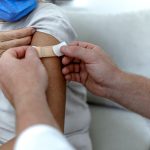-
January 27: The Week in Cancer News
Many women underestimate dense breast effect on cancer risk, and FDA approves targeted therapy for colorectal cancer.
by Kevin McLaughlin
-
An Evidence-Based Guide to Integrative Medicine
ASCO and the Society for Integrative Oncology issue recommendations for integrative medicine approaches that have been supported with research.
by Teresa Bergen
-
January 20: The Week in Cancer News
Women experience faster decline in physical function after cancer, and treatment quality for lung cancer varies across the US.
by Marci A. Landsmann
-
Comparing Costs of At-Home Colorectal Screening Tests
Cologuard and FIT have been found equally effective at screening for colorectal cancer and are widely used, but FIT is a fraction of the cost of Cologuard.
by Jon Kelvey
-
January 13: The Week in Cancer News
Women over 65 diagnosed at later stages of cervical cancer, and Black and Hispanic patients prescribed fewer opioids for end-of-life cancer care.
by Eric Fitzsimmons
-
A Personal Journey of Thyroid Cancer Treatment
The practical side of cancer treatment and life without a thyroid.
by Carly Flumer
-
January 6: The Week in Cancer News
Cancer patients have an increased risk of breakthrough COVID-19 infections, and CAR T-cell therapy is safe for lymphoma patients with HIV.
by Thomas Celona
-
Women Less Satisfied With Cancer Care
Compared with men, women’s initial cancer symptoms are less likely to be taken seriously.
by Sandra Gordon
Cancer Talk
Immunotherapy for Early-stage Gastric Cancer
‘Practice-changing’ research shows adding immunotherapy before and after surgery reduced recurrences for early-stage gastric cancer.
by Laura Gesualdi Gilmore
Physical Activity Linked to Lower Colon Cancer RecurrenceParticipating in a structured exercise program after treatment was associated with a reduced risk of recurrence in people who had colon cancer.
by Sandra Gordon
Gaps in Survivorship Care Leave Unmet Needs After Cancer TreatmentA survey of head and neck cancer survivors reveals that many are not getting adequate survivorship care and may not even know it is available.
by Cameron Walker
Improving Communication for Deaf Cancer PatientsAfter a cancer diagnosis, people who are deaf or have hearing problems can struggle if accommodations don’t meet their communication needs.
by Eric Fitzsimmons












